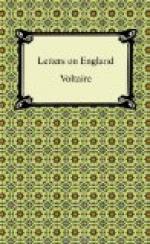The principal character in this comedy is one Homer, a sly fortune hunter, and the terror of all the City husbands. This fellow, in order to play a surer game, causes a report to be spread, that in his last illness, the surgeons had found it necessary to have him made a eunuch. Upon his appearing in this noble character, all the husbands in town flock to him with their wives, and now poor Homer is only puzzled about his choice. However, he gives the preference particularly to a little female peasant, a very harmless, innocent creature, who enjoys a fine flush of health, and cuckolds her husband with a simplicity that has infinitely more merit than the witty malice of the most experienced ladies. This play cannot indeed be called the school of good morals, but it is certainly the school of wit and true humour.
Sir John Vanbrugh has written several comedies, which are more humorous than those of Mr. Wycherley, but not so ingenious. Sir John was a man of pleasure, and likewise a poet and an architect. The general opinion is, that he is as sprightly in his writings as he is heavy in his buildings. It is he who raised the famous Castle of Blenheim, a ponderous and lasting monument of our unfortunate Battle of Hochstet. Were the apartments but as spacious as the walls are thick, this castle would be commodious enough. Some wag, in an epitaph he made on Sir John Vanbrugh, has these lines:—
“Earth lie light on him, for
he
Laid many a heavy load on thee.”
Sir John having taken a tour into France before the glorious war that broke out in 1701, was thrown into the Bastille, and detained there for some time, without being ever able to discover the motive which had prompted our ministry to indulge him with this mark of their distinction. He wrote a comedy during his confinement; and a circumstance which appears to me very extraordinary is, that we don’t meet with so much as a single satirical stroke against the country in which he had been so injuriously treated.
The late Mr. Congreve raised the glory of comedy to a greater height than any English writer before or since his time. He wrote only a few plays, but they are all excellent in their kind. The laws of the drama are strictly observed in them; they abound with characters all which are shadowed with the utmost delicacy, and we don’t meet with so much as one low or coarse jest. The language is everywhere that of men of honour, but their actions are those of knaves—a proof that he was perfectly well acquainted with human nature, and frequented what we call polite company. He was infirm and come to the verge of life when I knew him. Mr. Congreve had one defect, which was his entertaining too mean an idea of his first profession (that of a writer), though it was to this he owed his fame and fortune. He spoke of his works as of trifles that were beneath him; and hinted to me, in our first conversation, that I should visit him upon no other footing than that of a gentleman who led a life of plainness and simplicity. I answered, that had he been so unfortunate as to be a mere gentleman, I should never have come to see him; and I was very much disgusted at so unseasonable a piece of vanity.




